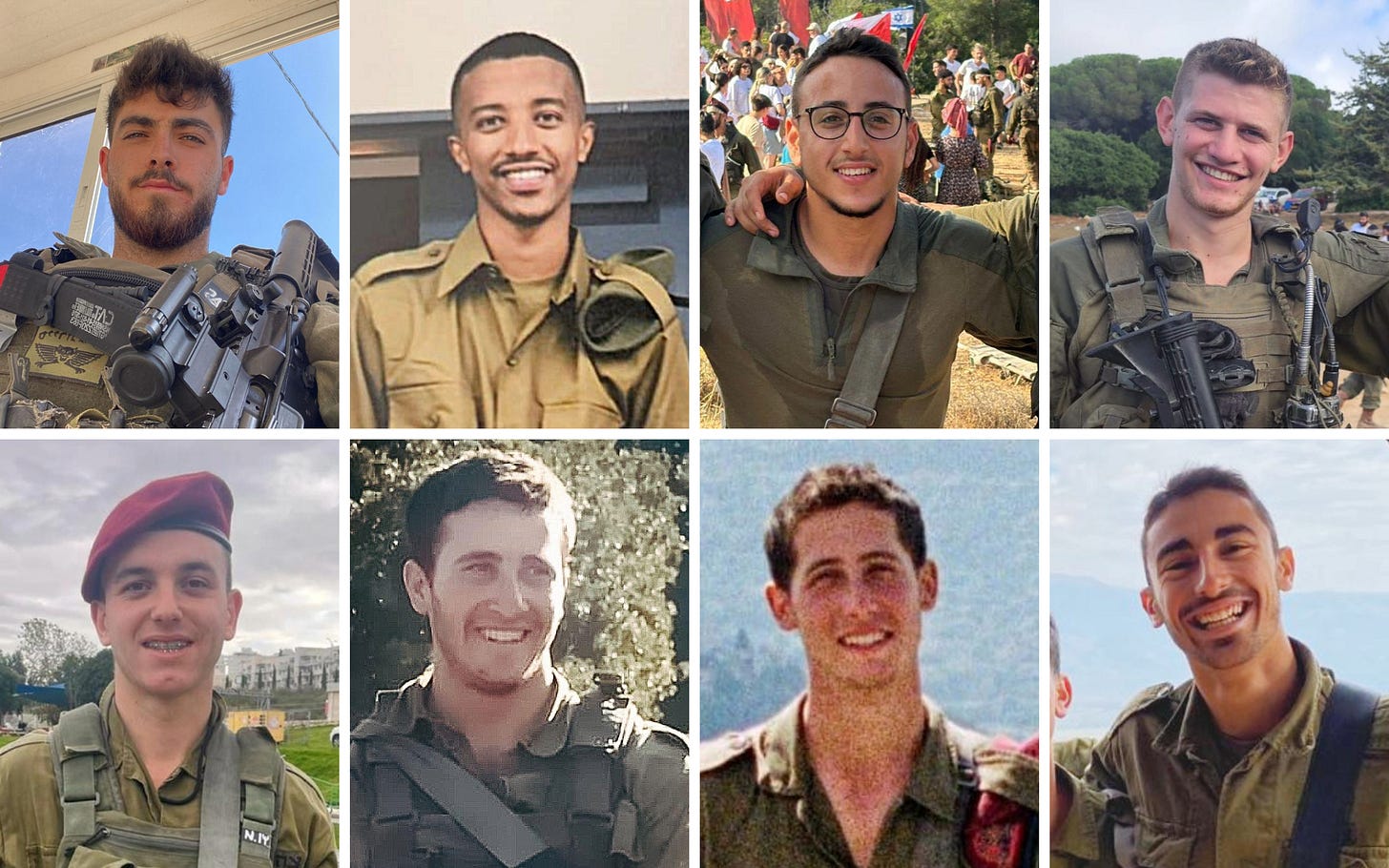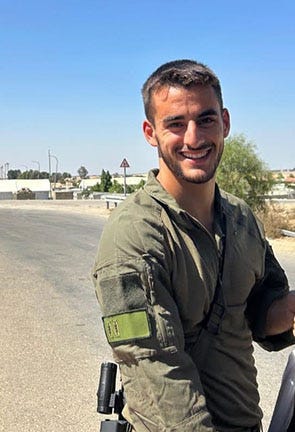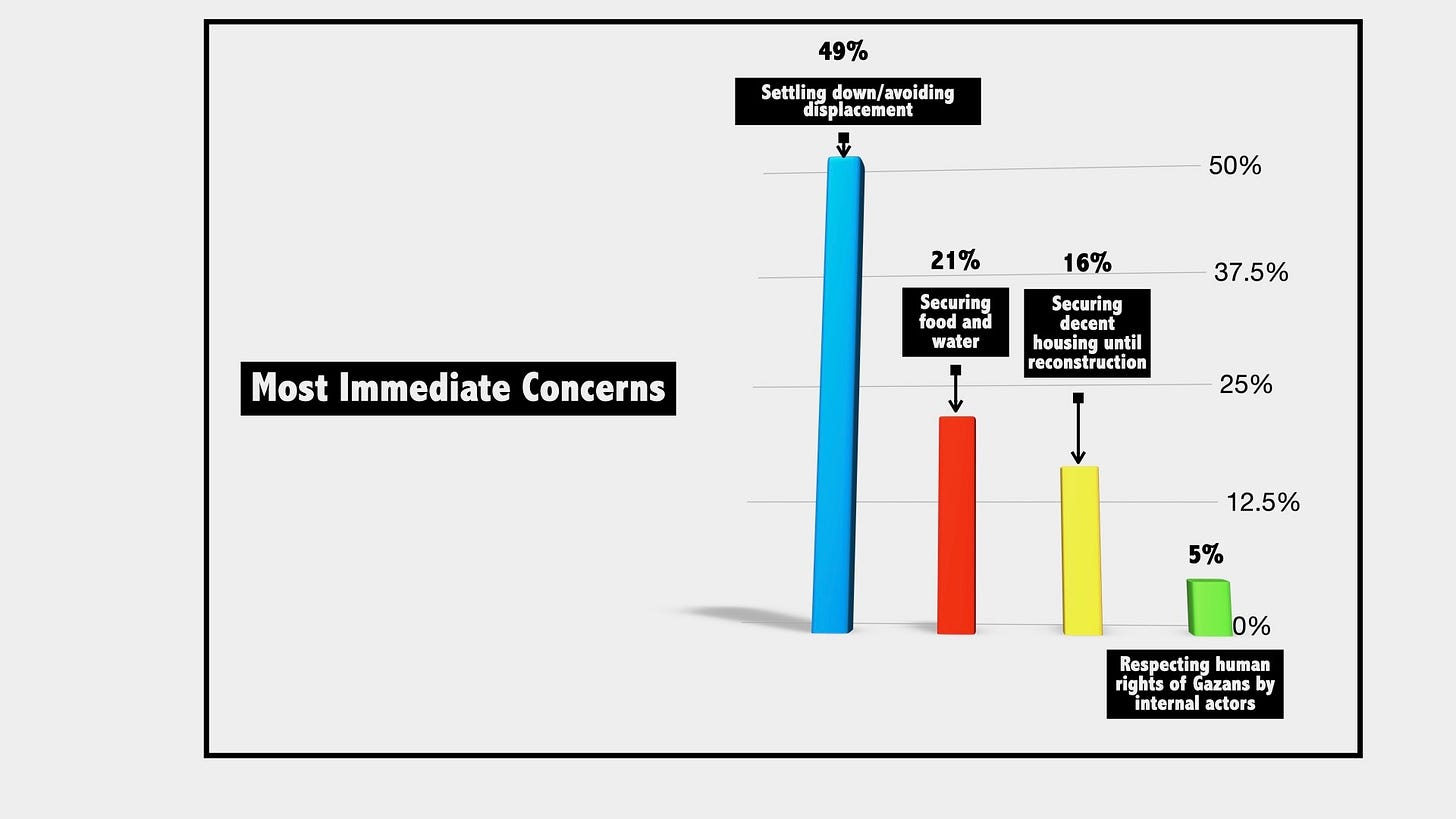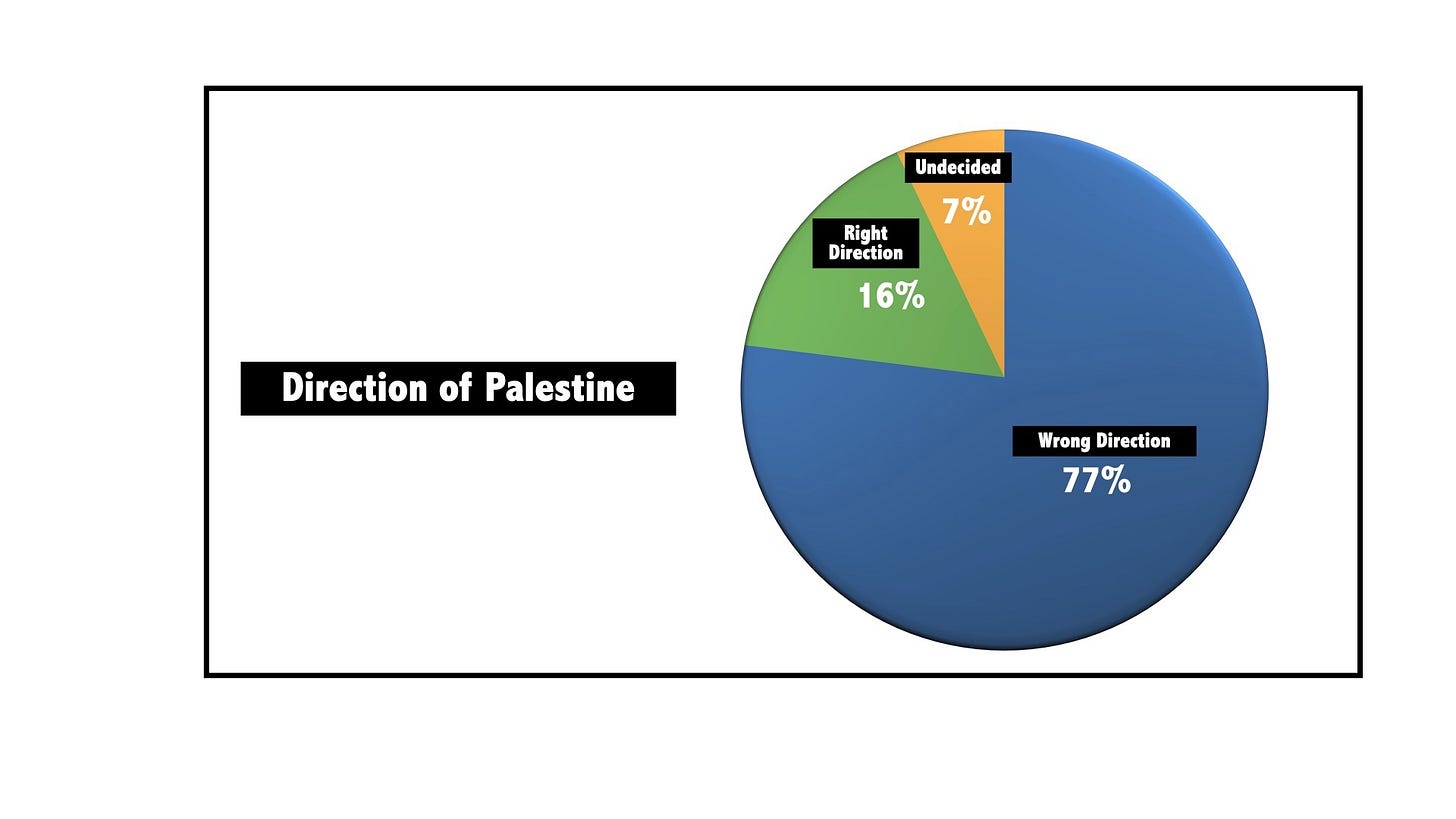DAY 364 OF THE WAR: Eleven Israeli Soldiers Killed, Iran Awaits Israel’s Response, Israel Eliminates Many Remaining Hezbollah Leaders as Rockets Continue to Rain Down on the North.
Tel Aviv Diary September 5, 2024
ZOOM Briefing: Sunday, October 6th, 6 PM Israel Time • 4 PM GB • 11 AM EDT • 8 AM PDT. Invitations will go out in the morning.
As the final hours of the Jewish year waned and the sunset, Israelis were dealt a devastating gut punch as the names of seven soldiers killed in combat in South Lebanon were released. Just a few hours earlier, the name of an additional fallen soldier had been announced. The majority of the fallen soldiers served in the Egoz unit, which had been ambushed. During that assault, six soldiers died, and six more were critically injured. The extraction of the soldiers was tremendously difficult, necessitating additional firepower and specialized forces to complete the mission.
In another sector of the front, two soldiers from the Golani Reconnaissance Brigade were ambushed and killed in a separate attack. Although Israel successfully defended against an onslaught of 200 ballistic missiles without suffering serious casualties, within the same 24-hour span, a total of eight Israelis perished—all soldiers lost in ground combat at the hands of Hezbollah terrorists.

On Wednesday, Hezbollah managed to launch 120 rockets towards northern Israel. Overnight, the Houthis deployed two drones; both were intercepted and shot down—one over Bat Yam, just south of Tel Aviv, and the other off the coast.
STARTING OFF 5785 IN THE NORTH …
On the first day of Rosh Hashanah, we saw fighting on multiple fronts.
The Air Force continued its attacks in Lebanon, targeting sites believed to include Hezbollah’s intelligence headquarters, among other strategic locations. In retaliation for ongoing rocket fire on the Galilee, reaching as far south as Haifa, the Army ordered the evacuation of 22 additional villages in southern Lebanon, including some beyond the Litani River. On Thursday, Hezbollah launched 200 rockets at Israel, but no casualties were reported.
The Army reported the loss of another soldier, Captain Ben Zion Falach, in southern Lebanon on Thursday.
That night, Israel conducted intense bombings in Beirut, targeting Hashem Safieddine, believed to be Nasrallah’s successor. The Israeli Air Force also claimed to have killed Muhammad Yousf Anisi, a prominent member of Hezbollah's precision rocket development team. Additionally, the IDF eliminated Mohammad Rashid Sakaafi, a veteran Hezbollah operative who had served as head of the communications network since 2000. Sakaafi, who had close ties to senior Hezbollah leaders, wielded significant influence within the organization. Israel also struck a large underground bunker near the Beirut airport, believed to be where Hashem Safieddine and several others were killed.
IRAQI SUICIDE DRONE
On Thursday night, Iraqi Shiites launched a suicide drone that struck an army base in the Northern Golan Heights, resulting in the deaths of Sergeant Daniel Aviv Haim Sofer (19) and Corporal Tal Dror (19). The attack also severely injured a reservist and wounded 23 others.
LEBANON
The Army reported that, thus far, in the ground operation, the IDF has eliminated 440 Hezbollah fighters in southern Lebanon, including 21 commanders.
Israeli airplanes destroyed a 3-kilometer tunnel extending from Lebanon into Syria, which was utilized to smuggle weapons. The tunnel, operated by Hezbollah's 4400 unit responsible for weapons procurement, had its operations disrupted. Additionally, the commander of this unit was recently killed in Israeli airstrikes.
Once again, the Iranians attempted to send a plane loaded with armaments to Lebanon, but it was forced to turn around and return to Iran. Israel has effectively enforced a military blockade, preventing Lebanon from receiving arms from Iran.
Saturday saw continued heavy fighting, with over 120 rockets launched towards various areas in northern Israel. This included two barrages of 25 and 30 rockets aimed at the Karmiel area. One rocket struck a house in Karmiel,
while another hit a home in Deir al-Asad. Since Wednesday, the start of the new year, a total of 800 rockets have been fired at Israel, though, remarkably, none of these attacks have resulted in any injuries.
The combat in Lebanon continues to intensify. Israel has deployed another division into the region. Speaking from inside Lebanon, Northern Command Chief, Major General Ori Gordin, stated:
From where we stand, we can look toward the frontline settlements. Our ground operation here is a significant step toward safely returning the residents of the north to their homes in anticipation of a better year than the previous one.
GAZA
The IDF announced that on Wednesday night, it conducted an airstrike in Deir al-Balah, located in central Gaza, resulting in the death of the terrorist Abd al-Aziz Salha— one of the terrorists involved in the notorious 2000 lynching in Ramallah, during which reservists Staff Sergeant (Res.) Yosef (Yossi) Avrahami and Corporal (Res.) Vadim Nurzhitz were both murdered. Salha is infamously recognized from a photograph in which he is seen displaying his blood-stained hands from a window following the lynching.
.The lynching was considered the defining moment at the onset of the second Intifada. The IDF also announced that it had killed Ruhi Mushtaha, a key veteran of the Hamas terrorist organization that July. Mushtaha had a direct influence on Hamas’s operational strategies, involving himself in military decision-making. Moreover, Mushtaha served as the head of governance in the Gaza Strip, holding the position of Prisoners’ Affairs in the organization’s political bureau and formerly overseeing its financial office. Until the war, he was the most senior and central figure of Hamas’s political wing in the Gaza Strip, orchestrating governance activities and participating in terrorist operations against Israel throughout the war. Mushtaha was the right-hand man of Hamas leader Yahya Sinwar and was considered one of his closest associates.
In addition, in recent weeks, forces of the 252nd Division have been conducting targeted raids in the central Gaza Strip. Over the past three months, the division’s forces have eliminated more than 450 terrorists in airstrikes and face-to-face encounters and have destroyed hundreds of terrorist infrastructures in the area. Underground, the forces identified and destroyed a network of underground tunnels stretching approximately eight kilometers within the Gaza Strip.
Furthermore, this week, during operations by the combat team of the 14th Brigade, dozens of armed terrorists were spotted moving towards the northern part of the Strip. After artillery, air, and shell fire were deployed, the suspects scattered.
WEST BANK
In a significant shift, the IDF has recently resumed employing air strikes in the West Bank to combat terrorist activities. Effective use of the Air Force was demonstrated on Thursday night when an IDF fighter jet conducted a precision strike in the Tulkarem area, eliminating multiple high-value targets—including the head of Hamas’s terror infrastructure in the region and Jit Radwan, a key Palestinian Islamic Jihad operative. The strike resulted in the confirmed elimination of seven terrorists in total, comprising members from both Hamas and Palestinian Islamic Jihad who were reportedly involved in explosive manufacturing and various terrorist operations against Israel and IDF forces.
REGARDING IRAN: I GOT IT WRONG…
I clearly erred when I previously wrote that didn't believe Iran would directly attack Israel this time. In my defense, I was not alone; some of the country's respected experts on Iran shared my view. Why was I mistaken? I thought the Iranian regime, despite its extremism, was logical and would act in its own best interest.
However, attacking Israel in retaliation for the killing of Nasrallah is clearly not in Iran's best interest—given that Iran has spent decades trying to avoid a direct confrontation with Israel. Attacking Israel now, when Hezbollah (its main deterrent against Israel) has been largely defanged, seems an illogical act. In recent years, especially since October 7th, Israeli politicians have been advocating for Israel to attack what is referred to as the “head of the snake,” with “the snake” representing the network of groups around Israel that Iran has funded, including Hamas, Hezbollah, the Houthis, and Shia militias in Iraq.
Until now, Israel has lacked a legitimate international pretext for attacking Iran—especially concerning the United States, which recognizes Israel’s desire for the U.S. to confront Iran but has deliberately avoided being drawn into that position for clear reasons. Given these motivations, it made no sense for Iran to provide Israel, and to a lesser extent, the U.S., with a legitimate reason to attack Iran directly.
Perhaps Iran thought their attack would be so effective that it would establish a new level of deterrence, particularly now that Hezbollah’s deterrence capability was so deeply compromised. This is a possibility, but they must have realized that thanks to Israel’s excellent air defense systems and its superlative civil defense systems, the odds were high that the result of their ballistic missile barrage would be minor. The attack seemed more like an act of anger by the Iranian Supreme Leader over the killing of his friend and confidant Nasrallah than a rational state action.
NEXT STEPS, FOLLOWING IRAN’S DIRECT ATTACK
There is universal consensus in Israel that a strong response is necessary following Iran’s attack. After the incident in April, our response in Iran was minimal—an action intended to discreetly teach the Iranians that we are capable of striking attack anywhere within their country. Last time, the American Administration pressured Israel to limit the response. This time, the position of the U.S. Administration is not entirely clear. The U.S. has hinted at some level of participation, but details remain vague. President Biden has expressed opposition to attacks on Iran’s nuclear sites and has also advised Israel against targeting Iran’s oil terminals. These U.S. suggestions likely indicate that Iranian military sites might be targeted. However, any speculation I make here could quickly become outdated.
EXCERPTS from the Supreme Leader of Iran's Friday Speech:
‘Tofan al-Aqsa’ (the events of 7.10 – editor’s note) is the legitimate and natural right of the Palestinian people. The recent Iranian response (the missile attack – editor’s note) is lawful and legitimate.
Nasrallah has left us in body, but his spirit will remain very present among us. Nasrallah was the voice that knew how to speak in the best way, courageously defending the oppressed and serving as a pillar for the fighters defending the truth.
YOUNG YAZIDI WOMAN FREED
It was reported on Thursday that in a remarkable rescue operation coordinated by the IDF, COGAT, and the U.S. Embassy in Israel, Fawzia Amin Sido, a 21-year-old Yazidi woman, has been freed from Gaza and reunited with her family in Iraq. Sido's ordeal began nearly a decade ago when, at just 11 years old, she was trafficked by ISIS members to a Hamas-affiliated ISIS operative in the Gaza Strip.
During Operation Iron Swords, the terrorist holding her was killed in IDF strikes, allowing her to flee to a hiding place within Gaza. Her eventual extraction was made possible through complex coordination between Israel, the United States, and other international officials, with Jewish philanthropist Steve Maman, known as the "Jewish Schindler," playing a role in her release.
This rescue highlights both the ongoing plight of the Yazidi people and the connections between Hamas and ISIS. The Yazidis, a Kurdish-speaking religious minority primarily from northern Iraq and Syria, faced genocide in 2014 when ISIS killed over 5,000 of their people and kidnapped thousands more. Of the more than 6,000 Yazidis captured by ISIS from the Sinjar region, many women and girls were sold into sexual slavery while boys were forced into jihadi indoctrination. While Iraqi authorities report that over 3,500 have been rescued or freed over the years, approximately 2,600 remain missing, making Sido's rescue a particularly significant victory in the ongoing effort to reunite displaced Yazidis with their families.
GAZA POLL RESULTS
Source: Arab World for Research and Development
Here, you can view the Full Poll:
U.S. CENTRAL COMMAND UPDATE [OCTOBER 4]
U.S. Central Command (CENTCOM) forces conducted strikes on 15 Houthi targets in Iranian-backed Houthi-controlled areas of Yemen today at about 5 p.m. (Sanaa time). These targets included Houthi offensive military capabilities. These actions were taken to protect freedom of navigation and make international waters safer and more secure for U.S., coalition, and merchant vessels.
TRANSPORT TO ISRAEL
Over the past week, the number of airlines flying to Israel has significantly decreased. Following the recent missile attacks, even the few remaining carriers have suspended their flights. Now, it’s up to El Al, which is operating at full capacity, along with the smaller airlines, Arkia and Israir, to maintain an air bridge for Israel.
We experienced this issue firsthand this week when my wife Amy, who also assists in editing these diary entries, was returning from a visit to Boston. She had traveled via Air France, which was still operating flights to Israel at the time. During her return journey, we were concerned they might cancel her connecting flight from Paris to Israel.
Unfortunately, we were unable to make alternative arrangements until the flight was officially canceled—at the last minute. We immediately coordinated with our terrific travel agent to secure an alternative booking on a Czech airline still flying to Israel. After double-checking with the airline's support, we were reassured they would continue to fly. So, Amy collected her luggage in Paris and, seven hours later, boarded her flight to Prague.
Once in Prague, Amy faced another seven-hour wait. During that time, Iran launched hundreds of ballistic missiles at us, leading Israel to close its airspace for an hour and a half. Consequently, the Czech airline she was booked with decided to cease its flights to Israel. Thankfully, our nimble travel agent managed to secure the last available seat on an El Al flight from Budapest to Tel Aviv. Amy spent a brief night at the Prague airport and flew to Budapest at 6 AM. Her El Al flight, delayed by less than two hours, departed just before noon and safely got her back home to us in time for Rosh Hashanah.
TWO WORTHWHILE READS
https://www.nationalreview.com/the-weekend-jolt/israel-didnt-start-the-fire/ by Judson Berger (National Review, Oct. 4, 2024)
… But with the region seemingly on the brink of an even wider war, Israel’s critics continue to portray the nation as the primary instigator and inflamer. To the contrary, the besieged country is reacting, not provoking, even now. That it has responded with ferocity and tactical brilliance these last several weeks does not change the fact that nearly one year after October 7, Israel is waging a multi-front war in response to the provocations of outside forces.
The Year American Jews Woke Up, by Brett Stephens (NY Times, Oct. 4, 2024)
At some point, an awakening of sorts occurred, perhaps not for every American Jew, but for many. I’ve called them the Oct. 8 Jews — those who woke up a day after our greatest tragedy since the Holocaust to see how little empathy there was for us in many of the spaces and, communities and institutions we thought we comfortably inhabited. It was an awakening that often came with a deeper set of realizations…One realization: American Jews should not expect reciprocity.
HOSTAGES
Sadly, there are absolutely no signs of any progress in negotiating a hostage release or ceasefire agreement with Hamas. Whether or not Sinwar is alive, there has been no communication from him at some point. Although there were moments when a partial agreement seemed possible, it now appears that Hamas is not interested in reaching any understanding. The 101 remaining hostages are the only leverage Sinwar still has, apart from the financial benefits gained from aid.
∞–––––∞–––––∞–––––∞–––––∞–––––∞–––––∞–––––∞–––––∞
A PIECE OF HISTORY
The Stage Club Bombing
On February 25, 2005, a Palestinian suicide bomber detonated explosives outside the Stage Club, a popular nightclub on Tel Aviv’s beachfront promenade. The bomber, identified as Abdullah Badran, a university student and member of Islamic Jihad, approached the club’s entrance, where he mingled with patrons before setting off the blast. The attack, which occurred late at night, resulted in the deaths of five Israelis and left over 50 others wounded.
The explosion caused significant destruction to the club and the surrounding area, shattering windows and sending debris flying. Emergency responders rushed to the scene, and the injured were quickly transported to nearby hospitals. A survivor described the chaos, saying,
I was standing in line when suddenly everything went black, and I was thrown to the ground by the force of the blast. People were screaming and running everywhere. The whole area was filled with smoke, and I could barely hear anything.
The bombing occurred at a time when hopes for peace were cautiously high following a recent ceasefire declaration between Israel and the Palestinian Authority. Despite this, Islamic Jihad claimed responsibility for the attack, positioning it as a response to Israeli actions and a challenge to ongoing peace efforts.
Israeli officials condemned the attack and called for stronger action against militant groups. The bombing also raised questions about the ability of the Palestinian Authority to control extremist factions within its territories. In response, Israeli forces launched a series of military operations targeting Islamic Jihad members and infrastructure in the West Bank.
The Stage Club bombing further strained the fragile ceasefire and escalated tensions in the region, underscoring the persistent challenges to achieving lasting peace. This attack was one of the deadliest in Tel Aviv in the period.














Re: todays Zoom and Trump: https://blogs.timesofisrael.com/israeli-support-for-trump/
Thankful for the liberation of Fawzia Amin Sid. I can't even imagine the trauma after 10 years of captivity and abuse.